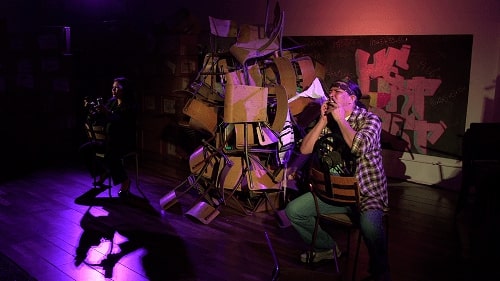 Cree playwright Kenneth T. Williams’ Bannock Republic comes to the Toronto Fringe Festival with the Centre for Indigenous Theatre. Written in 2010, the production feels as if it could have been written this month as the characters reveal the devastation of the generational trauma caused by the Residential School System.
Cree playwright Kenneth T. Williams’ Bannock Republic comes to the Toronto Fringe Festival with the Centre for Indigenous Theatre. Written in 2010, the production feels as if it could have been written this month as the characters reveal the devastation of the generational trauma caused by the Residential School System.
Bannock Republic is a complicated story from a renowned author. In 1992, Kenneth T. Williams became the first Indigenous person to receive an M.F.A in playwriting from the University of Alberta. He went on to write eight plays, two of which were published as books. Williams is currently on faculty at the University of Alberta in the drama department.
The plot concerns Isaac Thunderchild (Sam Twinn), the newly elected Band Chief, who is working to solve his Reserve’s finance problems while trying to preserve the Residential School building that sits nearby. The government will pay to demolish the building, which would end the financial issues. However, Isaac feels the residential school building is an important memorial and reminder of the genocide perpetrated on Indigenous peoples.
The play begins as a comedy. The characters are larger than life as they bicker amongst themselves. Jacob Thunderchild (Jeremy Proulx) is a standout, as he mourns the “death” of his beloved car named Stella. Later, Jacob complains about covering kindergarten graduations for APTN (Aboriginal Peoples Television Network). But the play quickly grows dark as we learn about family trauma, residential schools, and the nature of heartbreak.
Despite an engaging script, I felt that this production of Bannock Republic was difficult to follow at times. The acting was passionate, but the complexities of each character were sometimes a little lost for me. The three characters each represent a different viewpoint and lived experience of the issues affecting the Reserve.
Isaac is the Chief, and focused on preserving the memory of Residential Schools while saving the community from third-party management. Jacob is a reporter coming back home after 20 years to report on a story, but instead looking for a better one while grappling with his own trauma over Residential Schools. And Destiny is a business-minded government employee, on Reserve to implement third-party management decades after her grandparents were kicked off territory by a corrupt Band Council.
The many plotlines weave together to reveal larger problems. However, I felt the production didn’t always represent these issues clearly. I sometimes struggled to follow the plot, determine the setting, and understand the intricacies of the details tying it all together.
My guest agreed this production could have been more cohesive but enjoyed the funny, incongruous details of life on the Reserve that creep into the larger narrative. For example, as pressing as financial issues are for the community, Isaac is briefly unable to get a quorum for the Band Council meeting because there was a sale at Walmart on DVD players. The parts of everyday life that take precedence over more pressing community issues effectively add comedy to a serious subject. They’ll get there, but after the sale at Walmart.
These details served as comedic breaks in a very serious play whose themes are timely and necessary. The conversations surrounding Residential Schools and their legacy continue today. Bannock Republic reverberates particularly strongly against the backdrop of the recent discoveries of mass graves sites on Residential School properties, with many more locations yet to be searched.
The issues raised in this 2010 play must continue to be asked by Canadians, especially as more and more evidence of the tragedies of Residential Schools is finally circulating widely in the media. How can we properly honour and remember victims of residential schools as Indigenous communities deal with their legacy of trauma? Bannock Republic unveils the complexities of these questions with both humour and tragedy.
Details
- Bannock Republic is playing on-demand at the Virtual 2021 Toronto Fringe Festival.
- Purchase a $5 Membership to access the On-Demand programming on the Fringe website, then Pay What You Can to each show as you go, with the suggested price of $13 per show.
- Memberships can be purchased here. View the virtual on-demand show listings here.
- Accessibility notes:
- On-Demand shows: videos are closed captioned, transcripts are available for all audio content, documents are screen-reader friendly, and all digital images are provided with alternative text descriptions. These access supplements have been generated by the company and reviewed by the Festival. They may vary slightly from company to company.
- Fringe Primetime presentations will feature Auto-Transcribed Captioning.
- Content Warning: (Trigger Warning) Discussion of residential schools, mature language.
Photo of Pesch Nepoose andJeremy Proulx by Taye Alvis
